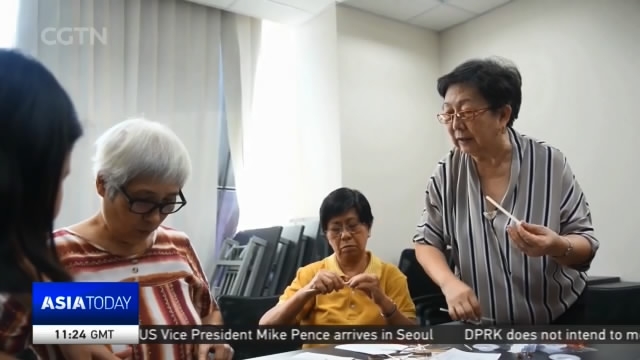
19:52, 08-Feb-2018
Dying with Dignity: Singaporeans find new ways to plan for death

Singapore, like many developed Asian countries, has an aging population. In this next piece, we find out how the elderly there are not only living well, but dying with dignity. Miro Lu has the story.
Rebecca Jee enjoys chatting with her friends and doing community activities in Chinatown, a historic area in Singapore with many elderly people. She's 69 years old, and wants to enjoy her golden years. That's why Rebecca decided to do Advanced Care Planning after learning about it two years ago. ACP is a series of discussions for people to plan their future health and personal care.
REBECCA JEE "If I'm living alone and my son is overseas, cannot come back, I might as well do ACP, so there's no need to trouble him to come back all this way to do what is my wish. As a nurse, I see a lot of suffering, like brain death and all that, and then the caregiver suffers a lot. Not only the patient but the caregiver has to go through such a long period. So I may as well, if I am on a respirator, and experiencing brain death, I might as well avoid this."
Rebecca values her independence, and doesn't want treatment that may affect her quality of life.
REBECCA JEE "No resuscitation. Because I already had a mild stroke many years back and I recovered. There's no point, if they resuscitate me and then my walking is not that good."
MIRO LU SINGAPORE "Death is a taboo topic in Asian society, but Singaporeans are slowly opening up. About 10,000 people have completed formal ACPs since they were launched seven years ago."
Life Point Centre, run by Sheng Hong Welfare Services, wants to make it easier for people to fulfill their last wishes. They hold regular talks to educate the elderly about advanced medical directives, wills, and ACPs.
SARA TAN EXECUTIVE DIRECTOR, SOCIETY OF SHENG HONG WELFARE SERVICES "One of the reasons Life Point wanted to do it in the community instead of in hospitals is that we want to normalize this process. We want to normalize this conversation that death is actually very much a part of life. Death is everybody's final destination."
This is important as Singapore is facing an aging population. By 2030, almost half the population will be at least 65. The Singapore Hospice Council has begun a three-year partnership with the Ministry of Health to raise awareness of palliative care since last year.
YEO TAN TAN CEO, SINGAPORE HOSPICE COUNCIL "We do things like research, for example in grief and bereavement. We also do quality improvements to make sure that there is good quality palliative care among all our members in Singapore. The last part would be on public education and community engagement. We would like the public to know more about palliative care, how it benefits them, and how it would be beneficial to them as a whole family, not just the patient themselves."
As more people open up about their end of life wishes, Singaporeans can look forward not just to living well, but leaving well. Miro Lu, CGTN, Singapore.

SITEMAP
Copyright © 2018 CGTN. Beijing ICP prepared NO.16065310-3
Copyright © 2018 CGTN. Beijing ICP prepared NO.16065310-3